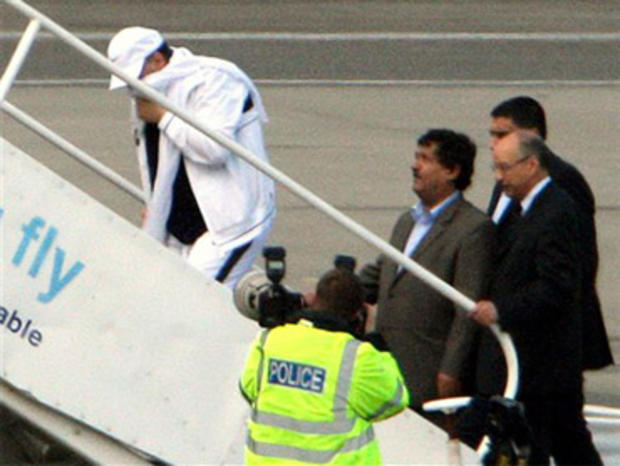WikiLeaks: Lockerbie Bomber Freed after Threats
For several months, the Libyan government engaged in a behind-the-scenes campaign for the release of the Lockerbie bomber and threatened "harsh, immediate" consequences if the man jailed for the bombing of Pan Am Flight 103 died in prison.
A British diplomat even wrote that the Libyan government promised "enormous repercussions" if the release of bomber Abdel Baset al-Megrahi was not handled properly, the Guardian newspaper of London reported Tuesday evening.
The disclosure comes from the trove of secret State Department cables released to a number of news outlets by the document-dumping website WikiLeaks.
Megrahi was released from a Scottish prison in August 2009 after doctors said he had only months left to live before dieing from prostate cancer. The U.S. government reacted to the release harshly, sparking congressional hearings and a public rebuke from President Obama. Megrahi continues to live in Tripoli after being escorted back to Libya by the son of Moammar Qaddafi, the country's leader, more than a year ago, the Guardian reported.
Leaked cables show that the Scottish government knew Megrahi could survive for up to five years after his September 2008 cancer diagnosis, the Guardian reported. However, one cable estimated Megrahi's lifespan between 18 months and two years.
"Doctors are not sure where he is on the time scale," Scottish Justice Minister Jack Straw wrote in a secret cable to Washington.
The cables show that the British government was heavily pressured to release Megrahi, the Guardian reported.
"The consequences if Megrahi were to die in prison ... would be harsh, immediate and not easily remedied ... specific threats have included the immediate cessation of all UK commercial activity in Libya, a diminishment or severing of political ties, and demonstrations against official UK facilities," U.S. Ambassador Gene Cretz wrote in a January 2009 cable about a conversation between the Libyan government and U.K. embassy officers. "[Libyan] officials also implied, but did not directly state, that the welfare of UK diplomats and citizens in Libya would be at risk."
Questions Remain over Lockerbie Bomber's Release
Describing the Libyans' approach as "thuggish," Cretz also cautioned the U.S. from entering into the negotiations between Libya and the U.K., the Guardian reported.
"If the [US government] publicly opposes al-Megrahi's release or is perceived to be complicit in a decision to keep al-Megrahi in prison, [America's Libyan diplomatic] post judges that US interests could face similar consequences," Cretz wrote.
More on WikiLeaks
Pentagon: WikiLeaks has Hurt Foreign Relations
WikiLeaks Founder Julian Assange Arrested in UK
WikiLeaks: U.S. Can't Stop Middle East Arms Race
WikiLeaks Is Winning the Info War So Far
Swiss Cut Off WikiLeaks' Bank Account
WikiLeaks' Swedish Servers May Be Under Attack
Video: Julian Assange's Life on the Run
